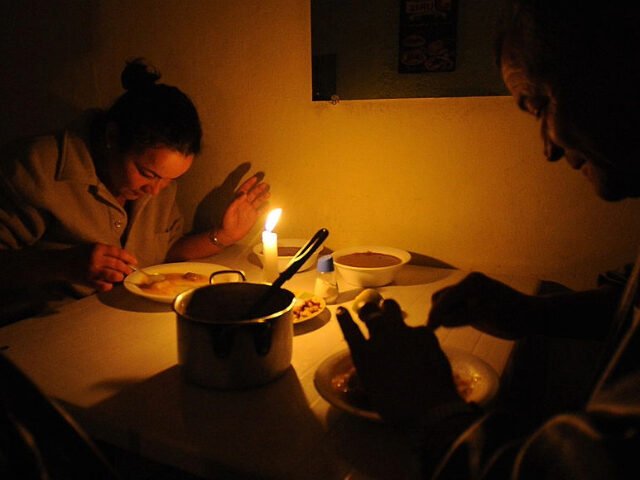Ecuador suffered a nationwide power blackout on Wednesday afternoon, leaving the entire country and its roughly 17 million citizens without power for more than three hours.
Ecuador, which had not experienced a comparable near-nationwide blackout since 2016, is undergoing a severe energy crisis that worsened in April 2024, when deficits in power generation led to rolling power blackouts of up to eight hours in some of its cities, including Quito, the country’s capital. The situation prompted President Daniel Noboa to declare a 60-day state of emergency on April 19.
The Ecuadorian government attributed Wednesday’s blackout to a purported lack of investment and maintenance of the country’s power grid infrastructure by previous administrations.
Reports of power blackouts across several Ecuadorian cities first began surfacing at around 3:17 p.m. on Wednesday, with the blackout rapidly expanding across the country. Ecuadorian Energy Minister Roberto Luque announced on social media as the blackout was underway that it was caused by a failure in the transmission line that caused a “cascade disconnection” that left the country without power.
Luque informed in another post on Wednesday evening that 95 percent of power distribution had been restored as of 6:41 p.m.
ACTUALIZACIÓN RESTABLECIMIENTO DE ENERGÍA
A las 15h17 hubo una falla de la Línea de Transmisión Milagro Zhoray que generó un "blackout" al sistema nacional.
Este evento es UN FIEL REFLEJO DE LA CRISIS ENERGÉTICA que vivimos, con falta de inversión en generación (lo que sucedió… pic.twitter.com/CQ5xsrc7T7
— Roberto Luque (@RobertoLuqueN) June 19, 2024
“This event is a true reflection of the energy crisis we are living, with lack of investment in generation (what happened in April), lack of investment in transmission (what happened today) and in distribution,” Luque said on social media. “For years there has been a lack of investment in these systems and today we are living the consequences.”
The nationwide blackout caused disruptions in the mass transportation systems of Ecuadorian cities, such as Quito’s subway, Cuenta’s tramway, and Guayaquil’s cable car. In Quito, subway users were forced to walk through the tunnels in the dark. Quito Mayor Pabel Muñoz reportedly stressed that the blackout must have been “very significant for it to have affected even the energy in the Quito Metro, which uses an isolated system.”
El apagón a nivel nacional colapsó el sistema del metro en Quito, obligando a los pasajeros a caminar por los túneles a oscuras. La situación ha generado dudas sobre la existencia de protocolos de emergencia en el Metro de Quito para estos casos. pic.twitter.com/Duq0ppx3W7
— Ecuador Al Día 365 (@ecuadoraldia365) June 19, 2024
Luque held a press conference on Wednesday evening in which he described the blackout as “one more sign that the country’s electric system is in crisis.” Luque assured that, while Ecuador has “overcome” the energy generation deficits that led to April’s rolling blackouts, the country continues to face challenges in terms of power distribution.
The minister stated that Ecuador’s energy crisis is a decades-old problem that has “several aspects,” such as a lack of investment in maintenance, new generation, transmission, and protection of the electricity infrastructure. The minister asserted that the blackout could have been avoided.
Luque explained that the blackout was caused by a failure of the 230,000-volt Milagro-Zhoray transmission line and pointed out that Ecuador faced a similar problem 20 years ago with a transmission line that had a systemic protection plan.
“After that failure, what starts to happen is that this energy starts to be transmitted by other routes and some of those lines failed and then the protection systems of certain generating plants,” Luque said. “Once that fails and power generation was less than demand, the whole system began to collapse.”
The minister stated that technical personnel and Ecuadorian Armed Forces members arrived at the site where the fault was reported and verified that there was no physical damage to the line.
Luque claimed that it is “unlikely” that a blackout like Wednesday’s would happen again on a national scale, claiming there is only a “one percent” chance of it repeating. The minister ensured that if a nationwide blackout does happen, he will ask for the resignation of those in charge.
The energy minister stated that the administrative response to the blackout will be to continue the protocols and plans to know the investment needed to mitigate the damages in the electric sector and avoid future damages to its infrastructure.
Christian K. Caruzo is a Venezuelan writer and documents life under socialism. You can follow him on Twitter here.

COMMENTS
Please let us know if you're having issues with commenting.